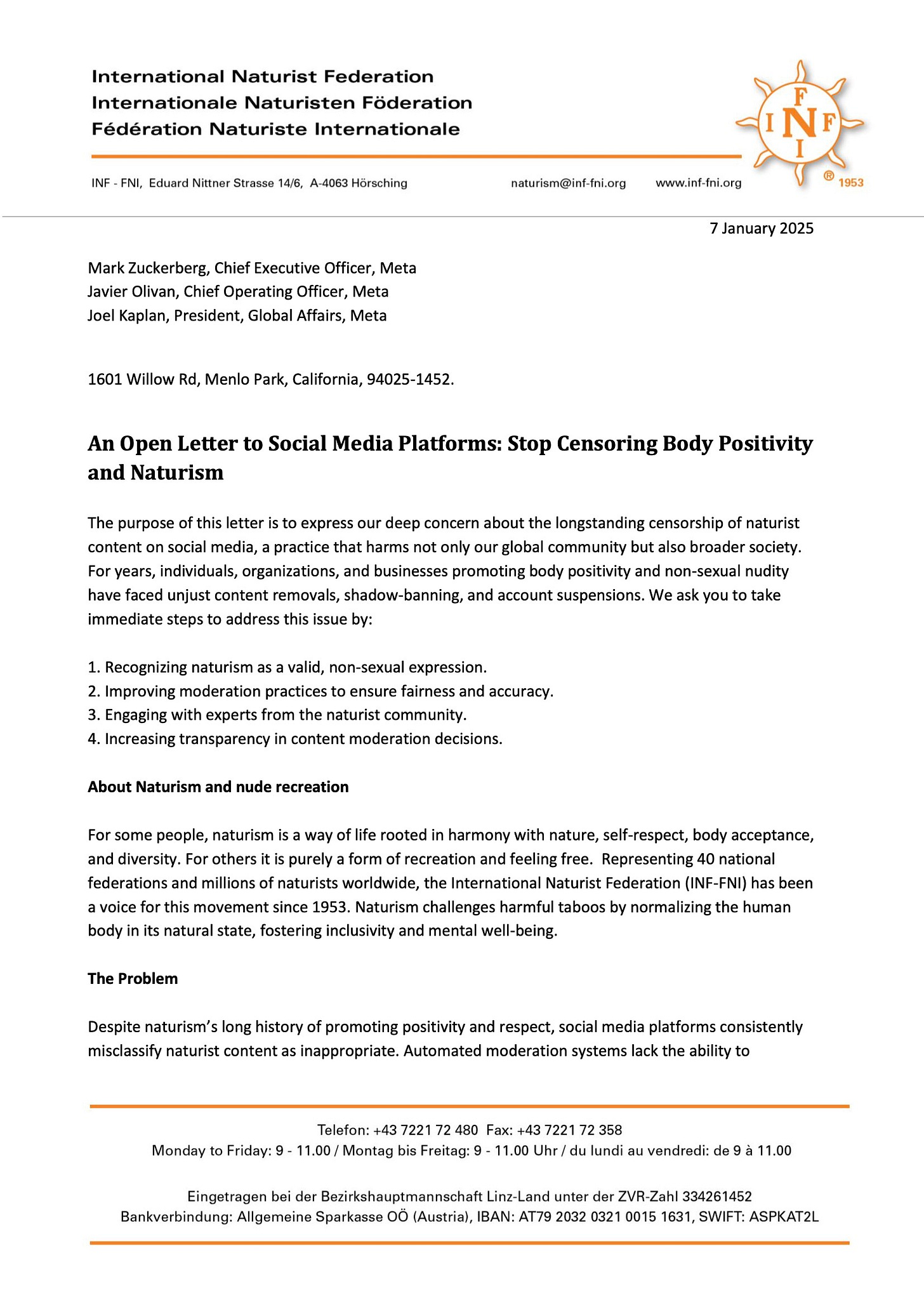Global naturist movement unites to challenge social media censorship
A coalition of 40 nations demands fairness for non-sexual nudity in an open letter sent directly to Meta
In an unprecedented global effort, naturist organizations and leaders from over forty countries have united to demand an end to the censorship of non-sexual nudity on social media. Spearheaded by the International Naturist Federation (INF-FNI), the open letter calls on platforms like Meta to reform their moderation policies. It has been sent directly to Meta and made public for other major tech firms, urging immediate action.
The letter has drawn signatures from countries as diverse as the UK, Canada, Colombia, the Netherlands, Peru, Austria, Senegal, France, Romania, Ireland, Thailand, Sweden, Australia, Germany, Finland, Belgium, Brazil, Croatia, New Zealand, South Africa, Hungary, Costa Rica, Mexico, and Portugal, among others. Notably, prominent American organizations, the American Association for Nude Recreation (AANR) and The Naturist Society Foundation (TNSF), both of which are not members of INF-FNI, have also signed the open letter in hopes of amplifying the message in the United States. Also signing onto the letter was the International Human Rights Foundation, a non-naturist humans rights group.
Meta’s problematic approach to moderation
While Meta’s Community Standards officially prohibit overt nudity, the application of these policies has shifted significantly in recent years. The policy statement “may help arrange or encourage sexual activities” has been broadly misapplied to justify the removal of content that has no connection to sexual activity—including posts by major charities and even links to mainstream news articles.
In January 2023, Meta’s Oversight Board—a panel of independent experts tasked with holding the company accountable—found that Meta’s internal moderation guidance was far broader than its stated rationale, leading to confusion for users and moderators alike. According to the Board, these policies have “greater barriers to expression for women, trans, and gender non-binary people,” particularly in contexts where nudity is culturally acceptable, such as bare-chested women in some regions.1
Rather than addressing these concerns, Meta’s recent shifts in moderation have exacerbated the problem. Naturists are not alone in their frustration; these policies disproportionately impact marginalized groups and reinforce harmful narratives around body shaming and idealized beauty standards.
Algorithmically delegitimizing naturism
For naturists, social media platforms are vital tools for building community, promoting events, and challenging taboos about the human body. Yet for years, inconsistent and overly aggressive moderation policies have caused posts to be removed, accounts suspended, and organizations shadow-banned—often for promoting body positivity and non-sexual nudity.
The consequences are widespread. Naturist organizations and businesses have lost visibility, revenue, and members, while individuals are left feeling stigmatized. Beyond naturism, these practices perpetuate harmful societal norms, reinforcing the idea that the human body is inherently shameful.
A call for change
The letter outlines four clear demands for Meta:
Recognize naturism as a valid, non-sexual expression with policy exceptions similar to those for artistic nudity.
Improve moderation systems to distinguish between explicit and non-sexual content.
Collaborate with naturist experts to ensure fairness in policy development and enforcement.
Increase transparency in moderation decisions and appeal processes.
The coalition makes it clear that these changes are necessary to create a more inclusive and respectful digital environment.

Beyond naturism: A cultural shift
This letter addresses a specific issue faced by naturists, but its implications go far beyond their community. Social media platforms are powerful arbiters of culture, shaping how people think about their bodies and themselves. By promoting inclusivity and authenticity rather than perpetuating shame, platforms like Meta have the chance to be leaders in fostering a healthier digital society.
This global coalition demonstrates the growing demand for change, not just from naturists but from advocates of fairness and body positivity worldwide. As the letter is made public and delivered to Meta, attention will be on whether these tech giants are ready to embrace the call for a more inclusive future. 🪐
Meta Oversight Board. (2023). Case decision: Adult nudity and sexual activity policy. https://www.oversightboard.com/decision/bun-ih313zhj/




Bravo! This appeal to common sense is well crafted and long overdue.
For years, I have made a point of reminding my friends and family on Facebook that I'm a nudist. After all, isn't the purpose of social media to exchange thoughts and beliefs, and to let our contacts know what we've been up to? I've often posted photos of myself, alone or among friends, just living my life nude. I've always being careful not to reveal my genitals or pubic hair. I've avoided images that place emphasis on my bare butt. All nudity on my profile has complied with Meta's stated "community standards," and for years I had no problem. Very occasionally an image would be deleted, but the appeals process was simple and effective and the photos were restored.
Within the past year or so, almost every nude picture I've posted on FB has been deleted and restrictions have been imposed on my account. Even photos posted years ago have suddenly been removed. The very limited menu of options available through the bot-driven appeals process does not allow for any explanation or discussion.
The most logical solution would be for more social media sites to offer content filters in settings, allowing users to select the degree of nudity, if any, they would be comfortable seeing. Flickr, for example, allows users to choose from "safe" (basically nothing more revealing than implied nudity, and absolutely nothing inherently sexual), "moderate" (which I interpret as no genital exposure, and probably no close-ups of buttocks or female nipples), and "restricted" (which, unfortunately lumps simple full nudity together with outright porn). This system is flawed, but it treats us as individuals capable of making our own decisions. What a concept!
I'm not very optimistic that this letter will result in significant change at Meta. Mark Zuckerberg seems less interested in equity or fairness than in how to boost the bottom line by pandering to the least common denominator. That said, it's important that the international naturist/nudist community has unified in an effort to create progress and change minds.
Since writing my previous comment, I have seen this related article. It will be interesting to see how those changes at Meta play out!
https://about.fb.com/news/2025/01/meta-more-speech-fewer-mistakes/